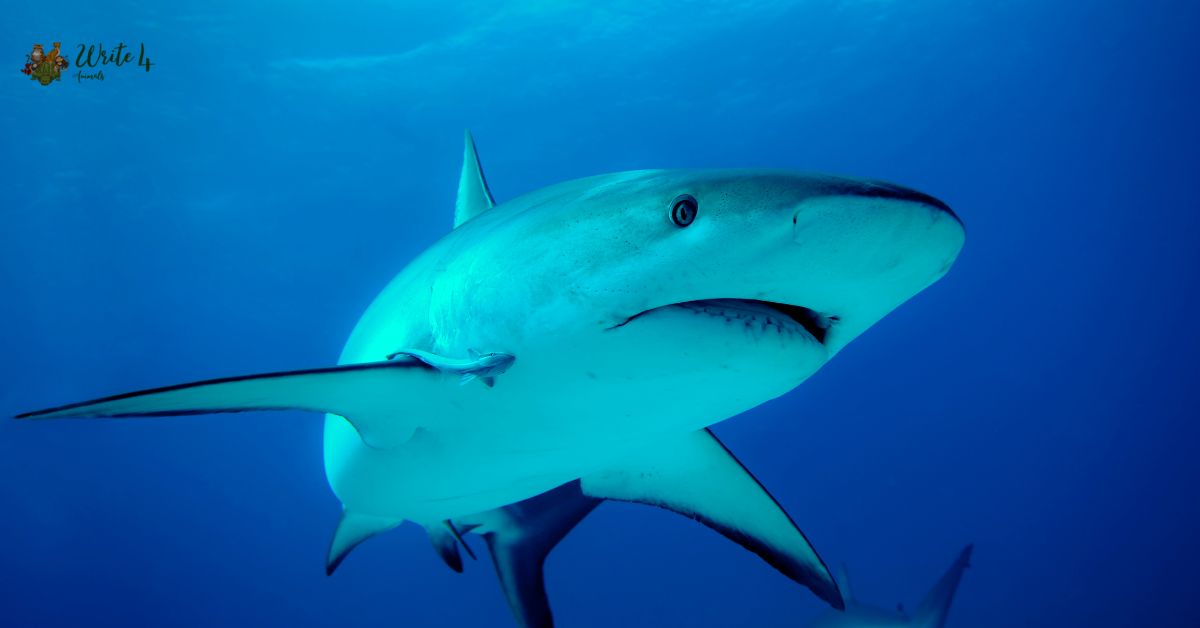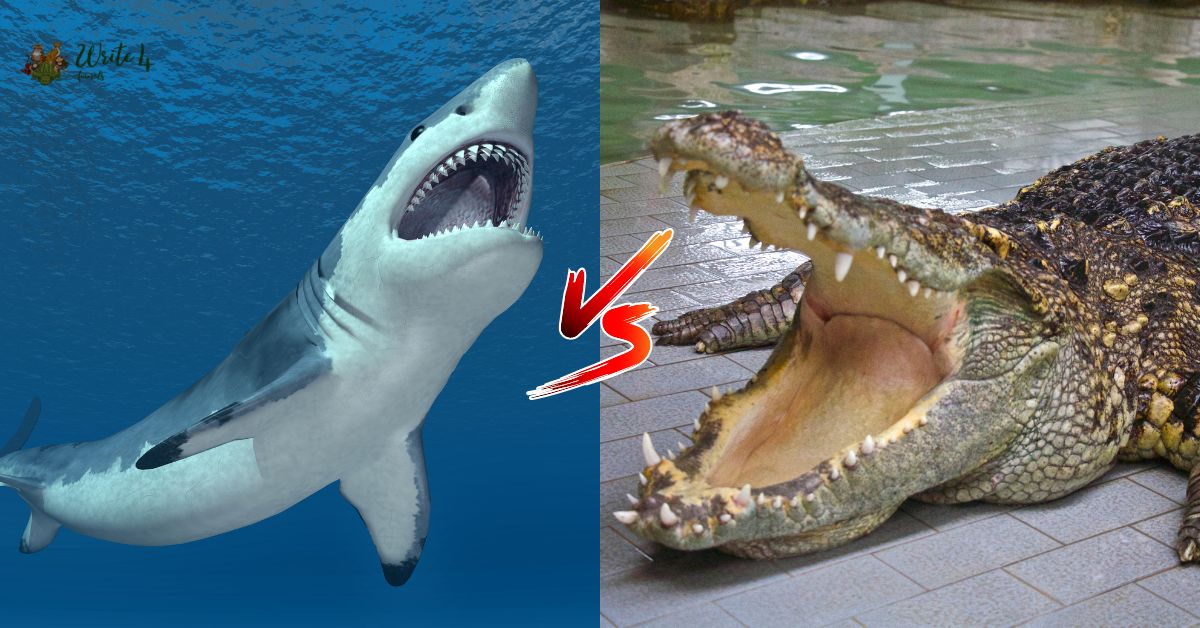In the depths of the world’s oceans and rivers, two formidable predators reign supreme – the crocodile and the shark. Both animals are apex predators, honed by millions of years of evolution to dominate their respective environments. When it comes to a hypothetical showdown between these ancient adversaries, who would emerge victorious? In this blog post, we will delve into the world of crocodile vs shark, exploring their physical attributes, hunting techniques, and the likelihood of such an encounter in the wild.
Crocodile vs Shark Comparison
Crocodile vs Shark: History and Origins
The history of the crocodile and the shark dates back millions of years, showcasing their resilience and evolutionary success. Crocodiles are descendants of archosaurs, a group of reptiles that emerged during the Triassic period, approximately 250 million years ago. Fossil evidence reveals that early crocodile-like creatures thrived in the ancient supercontinent of Pangaea.
Sharks, on the other hand, belong to the elasmobranch subclass, tracing their lineage to the Devonian period, over 400 million years ago. Ancient shark species were significantly different from their modern counterparts, with some reaching enormous sizes.
Throughout their existence, both crocodiles and sharks have adapted to various ecological changes and emerged as apex predators in their respective habitats. The long evolutionary histories of these creatures have contributed to their remarkable success as fearsome hunters in their aquatic domains.
Crocodile vs Shark: Physical Features
The crocodile and the shark possess distinct physical features that aid them in their roles as apex predators. Crocodiles boast a rugged, armored appearance, with tough, scaly skin that acts as natural protection against potential threats. Their robust bodies are equipped with powerful limbs and webbed feet, allowing them to maneuver swiftly through both water and land.
Sharks, on the other hand, are streamlined and built for swift, agile movement through water. Their sleek bodies reduce drag and enhance their predatory efficiency. Covered in dermal denticles instead of traditional scales, their skin offers a hydrodynamic advantage, enabling them to glide smoothly through the water.
Both predators have strong jaws filled with numerous sharp teeth. Crocodiles have interlocking teeth that are perfect for gripping and tearing prey, while sharks’ teeth are continually replaced throughout their lives, ensuring they are always sharp and ready for hunting.
Crocodile vs Shark: Combat Skills
In a hypothetical battle between a crocodile and a shark, both animals possess formidable combat skills uniquely suited to their environments. Crocodiles are ambush predators, relying on stealth and patience to approach their prey unnoticed.
Once within striking distance, they can launch a lightning-fast attack, using their powerful jaws to grab and subdue their victims. Their immense bite force, combined with the “death roll” technique, can be lethal to both land animals and aquatic prey.
Sharks, on the other hand, are opportunistic hunters, relying on keen senses, especially their exceptional sense of smell, to detect potential food sources. Their ambush tactics involve swift bursts of speed to surprise and seize their prey. Sharks employ a “bump and bite” technique, where they use their sharp teeth to take a single, decisive bite, often leading to a quick kill.
Crocodile vs Shark: Behavior and Social Structure
Crocodiles are generally solitary creatures, though they can sometimes be found in groups called congregations, especially during breeding seasons or when food sources are plentiful. They establish territories and are known for their territorial behavior, especially during the nesting period. Male crocodiles are more aggressive and dominant, fiercely defending their territory from rivals.
Sharks, on the other hand, exhibit a more diverse range of social structures. Some species, like the great white shark, are predominantly solitary, while others, like the scalloped hammerhead, form schools or shoals. Sharks engage in social behaviors like courtship displays and hierarchical structures within schools.
Crocodile vs Shark: Hunting and Diet
Crocodiles and sharks have distinctly different hunting strategies and diets. Crocodiles are opportunistic predators, mainly preying on a variety of animals, including fish, birds, mammals, and even other reptiles. They often wait patiently near the water’s edge or lie partially submerged, using their stealth to surprise unsuspecting prey. Their powerful jaws and sharp teeth allow them to capture and subdue their victims, using the “death roll” technique to tear apart larger prey.
Sharks, on the other hand, are primarily carnivorous and mainly feed on fish, cephalopods, and other marine creatures. Their hunting tactics vary depending on the species. Some sharks are active hunters, relying on speed and agility to chase down their prey, while others are ambush predators, lurking in the shadows and striking when an opportunity arises.

Sharks are known for their acute senses, especially their sense of smell, which enables them to detect the scent of prey from miles away.
Crocodile vs Shark: Key Differences
Despite their shared status as apex predators, crocodiles and sharks differ significantly in their physical characteristics, behavior, and habitat preferences. Crocodiles are primarily freshwater or brackish water dwellers, although some species, like the saltwater crocodile, can tolerate saltwater and venture into estuaries and coastal areas. Sharks, on the other hand, are exclusively marine animals, found in oceans around the world.
The physical attributes of crocodiles, such as their armored bodies and powerful jaws, make them formidable adversaries in both water and land environments. In contrast, sharks possess streamlined bodies, hydrodynamic skin, and exceptional swimming abilities that allow them to navigate through the water with precision and speed. These key differences in anatomy and habitat preference contribute to their unique hunting strategies and survival techniques.
Crocodile vs Shark: The Key Factors in a Fight
In a hypothetical encounter between a crocodile and a shark, several factors would come into play to determine the outcome. Location plays a crucial role, as it would decide whether the battle takes place in water or on land. Both animals are well-adapted to their respective environments, but the advantage could shift depending on the setting.
Another critical factor is the size and species of each combatant. Larger crocodile species, like the saltwater crocodile, can reach lengths of over 20 feet and weigh up to 2,000 kilograms, while some sharks, like the great white shark, can grow over 20 feet long and weigh more than 2,000 kilograms as well. A significant size difference could sway the battle in favor of the larger and more powerful predator.
Crocodile vs Shark: Who Would Win in a Fight
A direct confrontation between a crocodile and a shark is exceedingly rare in nature, as their habitats seldom overlap. If such an encounter were to occur, the result would be unpredictable and heavily dependent on the specific circumstances. Both crocodiles and sharks are well-equipped to defend themselves and deliver lethal attacks.
In water, sharks would have the advantage due to their superior swimming abilities and agility. On land, crocodiles would hold the upper hand with their powerful jaws and agility in their element. Ultimately, the outcome of such a confrontation would be determined by various factors, making it impossible to definitively declare a winner.
Frequently Asked Questions
[sc_fs_multi_faq headline-0=”h4″ question-0=”Who would win in a fight between a crocodile and a shark?” answer-0=”A direct fight between a crocodile and a shark is unlikely, as their habitats rarely overlap. The outcome would depend on factors like size, species, location, and individual temperament.” image-0=”” headline-1=”h4″ question-1=”What do crocodiles eat?” answer-1=”Crocodiles are opportunistic predators and feed on a variety of animals, including fish, birds, mammals, and other reptiles. ” image-1=”” headline-2=”h4″ question-2=”What is a shark’s diet?” answer-2=”Sharks are carnivorous and primarily feed on fish, cephalopods, and other marine creatures.” image-2=”” headline-3=”h4″ question-3=”Are crocodiles and sharks related?” answer-3=”No, crocodiles and sharks are not closely related. Crocodiles are reptiles, while sharks belong to the elasmobranch subclass of fish.” image-3=”” headline-4=”h4″ question-4=” Where do crocodiles and sharks live?” answer-4=”Crocodiles are mainly found in freshwater or brackish water habitats, while sharks inhabit oceans around the world.” image-4=”” headline-5=”h4″ question-5=”Are crocodiles and sharks dangerous to humans?” answer-5=”Both crocodiles and sharks can be dangerous to humans if provoked or if they perceive humans as a threat.” image-5=”” headline-6=”h4″ question-6=”How fast can a crocodile swim?” answer-6=”Crocodiles can swim at speeds of up to 20-25 mph (32-40 km/h) in short bursts.” image-6=”” headline-7=”h4″ question-7=”Can sharks smell blood from miles away?” answer-7=”Yes, sharks have an exceptional sense of smell and can detect blood or other scents from miles away. ” image-7=”” headline-8=”h4″ question-8=”Do crocodiles and sharks have any predators?” answer-8=”As apex predators, crocodiles and sharks are at the top of their respective food chains and have few natural predato” image-8=”” count=”9″ html=”true” css_class=””]
Recommended
1. Elephant vs Lion: who will win ?
3. 21 Types of Lizards in Mexico (With Pictures) 2023
4. Wolf vs Husky: Unraveling the Similarities and Differences
